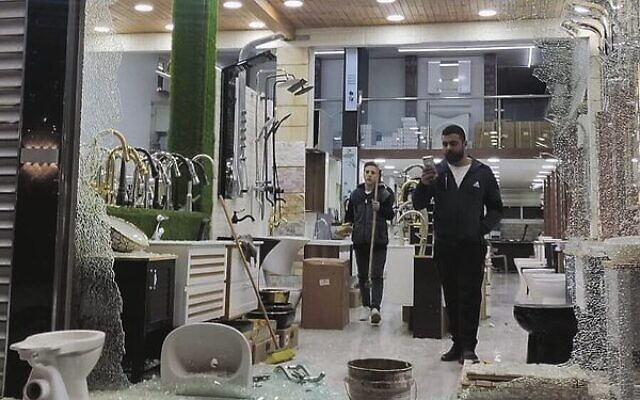Israel must crack down on Jewish extremists
The contentious issue of settler violence has once again broken into Israeli headlines.

Few dared imagine what would follow when, on September 16, 1982, Phalangist militants entered the Palestinian refugee camps of Sabra and Shatila in Beirut. Over the next 38 hours, the Christian-Lebanese militants raped, mutilated, tortured and murdered men, women and children, leaving between 700 and 3500 Palestinians dead.
So when, in a recent interview with Haaretz, Israeli Prime Minister Naftali Bennett evoked the memory of the Phalangists while condemning settler violence against Palestinians and left-wing activists, he wasn’t messing around.
But despite Bennett’s determination to “act against” such violence “with all our might”, one could be forgiven for wondering what exactly that means. Successive Israeli governments have, after all, displayed great unwillingness to clamp down on Jewish violence in the West Bank.
The contentious issue of settler violence has once again broken into Israeli headlines after horrific footage emerged of Jewish extremists attacking Palestinians and left-wing activists, followed by the vandalising of stores, homes and vehicles in the Palestinian West Bank town of Huwara just days later.
While these acts were condemned by politicians – albeit not widely so – Israelis are far more interested in how their leaders plan on combatting it. And the coalition isn’t off to a good start: Israeli soldiers recently detained an Israeli man accused of hurling rocks at Palestinians and handed him over to police, who, without making any record of the incident, immediately released him. Unfortunately, this forms part of a broader pattern of Israeli authorities failing to tackle Jewish extremism.
Israeli soldiers too, are known for their inaction at sites of settler violence; endless footage exists of soldiers standing idly by as Jews attack Palestinians in the West Bank.
Although Israeli media portrays settler violence as on the rise, statistics surrounding it are unreliable. Nevertheless, a recent The Times of Israel investigation painted a bleak picture, noting human rights group Yesh Din’s findings that “91 per cent of police investigations into attacks by Israelis on Palestinians between 2005 and 2019 were closed without indictments”.
This inexcusable moral blemish on Israel must stop.

Israelis are no strangers to far-right violence – Prime Minister Yitzhak Rabin was assassinated by a right-wing extremist. That 27 years later, Israeli authorities are yet to properly address such fanaticism is a shocking indictment on the nation’s leaders.
This was again highlighted in December 2020 following the death of teenager Ahuvia Sandak in a police car chase. With violent right-wing protests erupting alongside spikes in Jewish violence against Palestinians, security officials criticised politicians’ silence, claiming police “are losing control” over Jewish extremists. (Recent reports suggest that Sandak’s companions, who were accused of throwing rocks at Palestinians before the fatal car chase, will soon be indicted).
Indeed, these criminals represent a tiny fraction of the settler community (some aren’t even settlers). Neither are they encouraged by a systemic promotion of violence common in Palestinian society. But that is not, and never has been, an excuse to ignore years of violence that has left many Palestinians dead, injured and traumatised.
Take, for example, Amiram Ben-Uliel, who in 2015 firebombed the Dawabsha family’s West Bank home, killing parents Sa’ad and Riham and their 18-month-old son Ali. And although Ben-Uliel received three life sentences for what was an extraordinarily gruesome crime that shocked the Israeli public, this was a rare case where justice was served.
But besides this exception, Efrat mayor Oded Revivi told The Jerusalem Post, “There is a general understanding that no one is dealing with it – not in the circles of security and law enforcement, [and not] in the educational system or social services”.
And as The Jerusalem Post’s Yaakov Katz explained, “there is a type of lawlessness in the West Bank” that is unrecognisable across the Green Line. Observing the phenomenon of “wildcat” settlements (considered illegal even under Israeli law) Katz noted that Givat Ronen – served with demolition notices following an attack by settlers believed to be from the outpost – was illegally established in 1998. One can only wonder what took Israeli authorities 24 years to decide to demolish it.
Let’s not drown in semantics. This has no connection to whether Israel is “occupying” the West Bank, whether it’s called Judea and Samaria, or whether Israeli communities there are illegal. Nor is it about Palestinian terrorism. Rather, this question cuts to the core of what kind of country Israel wants to be, and how it responds to Jewish terrorism.
Retaining security control over much of the West Bank, Israel is responsible for protecting Palestinians from Jewish extremists. Its failure to do so sends a not-so-cryptic message that when it’s politically inconvenient, Palestinian lives don’t really matter.
Speaking to The Atlantic in December, Israeli Foreign Minister Yair Lapid revealed that Defense Minister Benny Gantz is forming a task force to effectively combat what he called “a stain on Israel”. But whereas a stain is defined by its difficulty to remove, Jewish extremist violence has long-been defined by Israeli leaders’ – both in the political and settler camps – unwillingness to confront it.
If Israel is to live up to its founding promises, that needs to change.
Josh Feldman is an active member of the community involved in informal education and Israel advocacy, and was part of the Australian delegation to the 38th World Zionist Congress. Twitter: @joshrfeldman.

comments